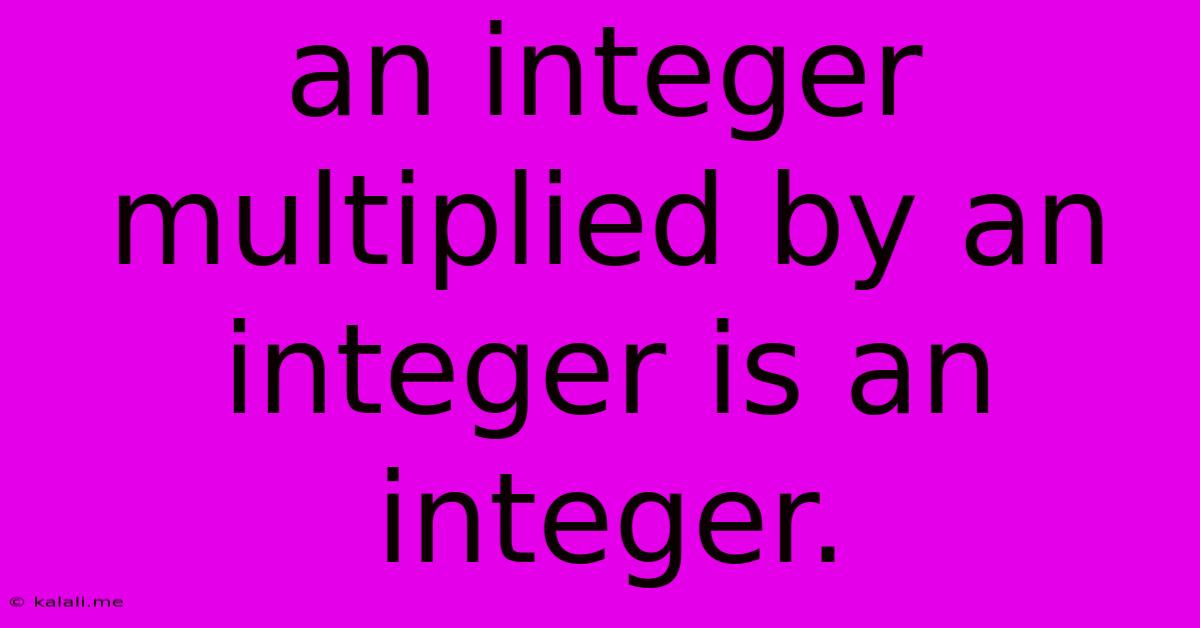An Integer Multiplied By An Integer Is An Integer.
Kalali
May 08, 2025 · 3 min read

Table of Contents
The Closure Property of Integers Under Multiplication: Why Multiplying Integers Always Results in an Integer
This article explores the fundamental property of integers: closure under multiplication. In simpler terms, we'll prove why multiplying any two integers always results in another integer. This seemingly obvious statement is a cornerstone of number theory and forms the basis for many more complex mathematical concepts. Understanding this property is crucial for anyone studying algebra, number theory, or even basic arithmetic. This article will clearly explain this concept, making it accessible to all levels of mathematical understanding.
Understanding Integers and Multiplication
Before diving into the proof, let's define our terms. Integers are whole numbers, including zero, and their negative counterparts. This includes numbers like -3, -2, -1, 0, 1, 2, 3, and so on. Multiplication, in its simplest form, is repeated addition. For example, 3 x 4 is the same as 3 + 3 + 3 + 3.
The closure property states that a set of numbers is closed under a particular operation if performing that operation on any two numbers in the set always produces a result that is also in that set. We will demonstrate that the set of integers is closed under multiplication.
Proving Closure Under Multiplication
We can prove the closure property of integers under multiplication using a few different approaches. Here's a straightforward method:
-
Case 1: Both integers are positive. Multiplying two positive integers always results in a positive integer. This is a fundamental concept learned in elementary arithmetic. For example, 2 x 3 = 6; 5 x 10 = 50. The result is always a whole number, thus an integer.
-
Case 2: One integer is positive and the other is negative. Multiplying a positive integer by a negative integer results in a negative integer. For instance, 2 x (-3) = -6; (-5) x 4 = -20. Again, the product is always a whole number—an integer.
-
Case 3: Both integers are negative. Multiplying two negative integers results in a positive integer. This is perhaps the least intuitive case, but it's a crucial aspect of integer arithmetic. For example, (-2) x (-3) = 6; (-5) x (-4) = 20. The outcome remains an integer.
-
Case 4: One or both integers are zero. Multiplying any integer by zero always results in zero, which is an integer. This holds true regardless of whether the other integer is positive, negative, or zero.
Conclusion: The Power of Closure
In each case, the product of two integers remains an integer. This consistent outcome demonstrates the closure property of integers under multiplication. This seemingly simple principle has significant implications in mathematics. It assures us that calculations involving integer multiplication will always produce predictable and consistent results, remaining within the set of integers. This foundational concept underpins more complex mathematical operations and theoretical frameworks. This property allows us to build upon the integers to explore more advanced mathematical concepts with confidence. Understanding this fundamental principle helps solidify your understanding of number theory and enhances your overall mathematical proficiency.
Latest Posts
Latest Posts
-
How Many Tablespoons Are In A Hidden Valley Ranch Packet
Jul 10, 2025
-
Which Is The Best Summary Of The Passage
Jul 10, 2025
-
How Many Quarts Of Soil In A Cubic Foot
Jul 10, 2025
-
What Is 3 4 Of A Pound
Jul 10, 2025
-
How To Measure 1 8 Teaspoon With 1 4 Teaspoon
Jul 10, 2025
Related Post
Thank you for visiting our website which covers about An Integer Multiplied By An Integer Is An Integer. . We hope the information provided has been useful to you. Feel free to contact us if you have any questions or need further assistance. See you next time and don't miss to bookmark.